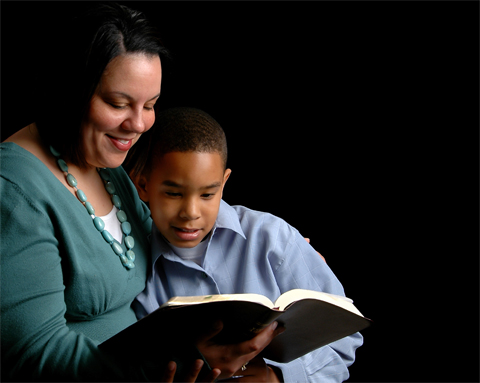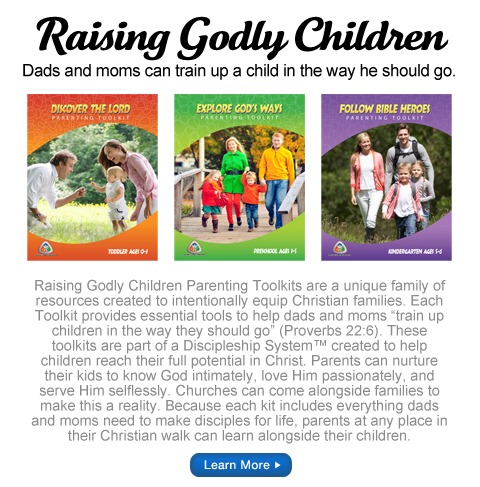“Everyone then who hears these words of mine and does them will be like a wise man who built his house on the rock. And the rain fell, and the floods came, and the winds blew and beat on that house, but it did not fall, because it had been founded on the rock. And everyone who hears these words of mine and does not do them will be like a foolish man who built his house on the sand. And the rain fell, and the floods came, and the winds blew and beat against that house, and it fell, and great was the fall of it”
Matthew 7:24-27 (ESV).
How Kids Think
Every child is different. Each child brings a variety of abilities, interests, and backgrounds to the classroom. Some children know a great deal about the Bible; others have no Christian instruction whatsoever. Teachers struggle to lay a foundation for groups of children who come from various backgrounds and have different worldviews.
How God Thinks
Learning is like climbing a ladder. Each rung must support us before we step higher. The early years provide the foundation for all other learning. Families in the Hebrew culture knew this and began instructing their children from a very young age in the Scriptures—teaching them to value God’s Word, and helping them learn the basics of the faith (Deuteronomy 6). Teaching God’s truth was seen as a lifestyle—not just a one-time lesson. As children grow, deeper understanding will be added to their biblical worldview. This higher-order information will make sense only when it is added to their existing foundation of knowledge.
True Story
During a week of camp ministry, it was very common for key questions to surface such as “How does the trinity work?” “How do you pray?” or “Why did God create Satan if He knew he’d be bad?” That and other light topics arose as the children were in their bunks about to fall asleep. The counselor and I would explain Scripture as simply as possible—praying for wisdom the entire time! One of my favorite dialogues came after a skit that contained a 3-headed man. Three staff members squeezed into this sown together suit. They performed a dialogue in this slapstick style object lesson that produced sidesplitting laughter from our crowd of 8-12 year olds. After the skit, I sat with one of the girls who had asked about the Trinity the night before. She understood the basics about God and was hungry to learn more about His nature. She sat beside me with three friends and had look of triumph as she shared, “So I realized the Trinity was just like a 3-headed person. They moved and acted together—but each head acted a little different!” I laughed as I nodded and responded to the way this information had clicked for her. This third grader was eager to build on her foundation of understanding and learn more about God!
Word Picture—“Foundations”
Every summer in the Midwest summer rains come and are accompanied by lighting and torrential downpours. This would cause flooding in the low parts of the city. After each storm, the telltale hoses would pump water out of the basements throughout the city. Because the flood plain was so high, flooding in homes was common, and often even the most minor flaw in the basement foundation would become a larger issue over time. Once the foundation started to leak, it was a challenge to go back in and fill the cracks in a way that would guarantee less future leakage.
Foundations of truth are equally vital. Just like houses under construction, children have unique opportunities to lay a Biblical foundation with expert craftsmanship—preventing future cracks and leaks. As building progresses, the foundation holds the structure secure—free from concern of collapse. As children are taught truths about God from a young age, they can handle the questions or storms that come later in life.
What You Can Do
Reinforce your child’s wobbly foundation. Remember that new understanding builds on previous learning.
- Become the expert of your child’s abilities and experiences. Seek a balanced foundation in the Christian faith—pay attention to what he/she is learning in church and at school. Look for opportunities to provide further training to ensure the foundation is secure.
- Discern right and wrong (2 Timothy 3:14-16). The Bible teaches what is true and points out what is wrong. The Bible guides your life and is your foundation for truth.
- Emphasize God’s character (Psalm 145:3-9). Teach about God’s character and His deeds. As your child understands the history of God’s relationship with mankind in the Bible—he/she will see consistency in God’s nature.
- Present the Gospel (1 Corinthians 3:9-11). Jesus’ life, death, and resurrection are an excellent starting place for understanding of the Christian faith.
Discipleship Begins With Our Children
Children need meaningful, shared-life relationships. That’s the heart of discipleship. DiscipleLand’s family of Biblical resources forms a complete Children’s Discipleship System™ – an intentional, relational, and transformational process designed to help children know God intimately, love Him passionately, and to serve Him selflessly. Click here for your Free Catalog
Learn more by clicking on the following:
• Samples
• Nursery and Toddler
• Preschool
• Kindergarten
• Elementary
• Kids Church
• Midweek
• Free Catalog







Sharing this article with Children’s Ministry Staff as we look for ways to help adults, especially parents view Christian education seriously. This article is straight forward. Using the resource gives realistic direction to our communication and shaping the attitudes even of our teachers and leaders. Thank you.